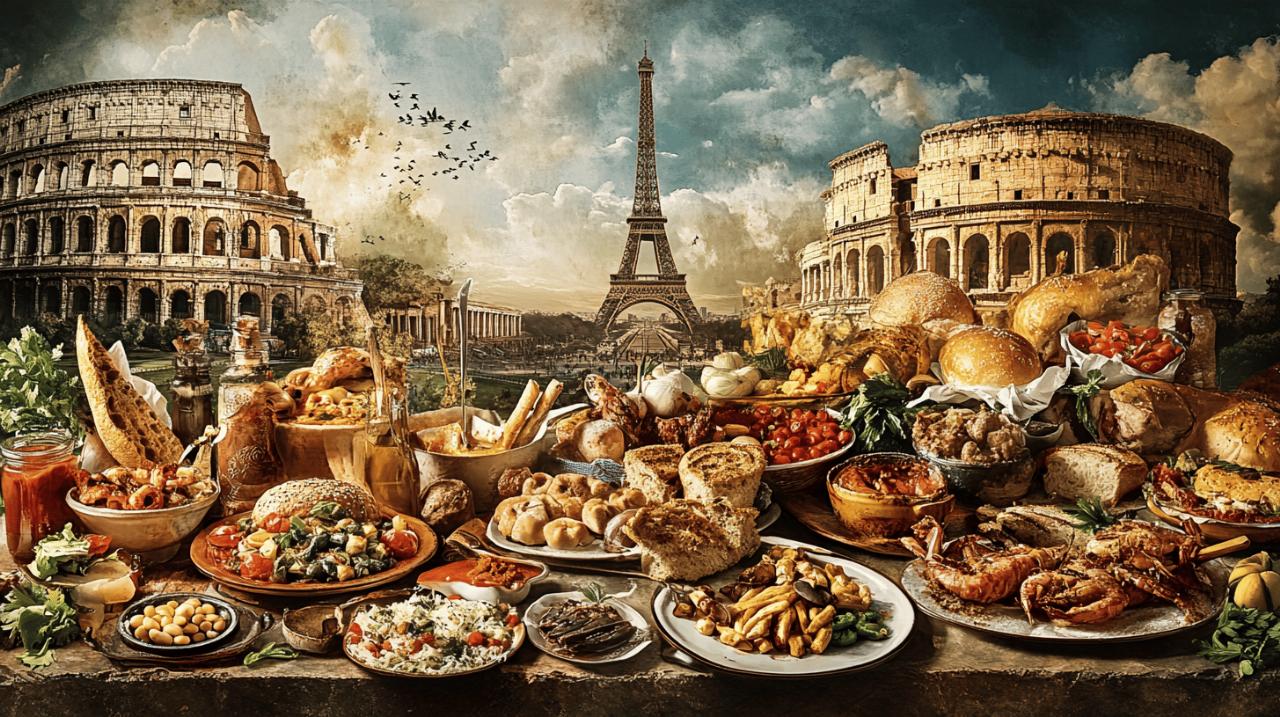Medieval gastronomy: beyond sustenance
The historical journey of gastronomy begins in the Middle Ages, where food was far more than mere nourishment. It served as a mirror to society itself, reflecting the complexities and nuances of the era. This evolution of culinary practices can be traced through various scholarly gatherings like the Oxford Food Symposium, which dedicates annual events to exploring the rich tapestry of food history and culture. Through these academic proceedings, we gain insight into how medieval gastronomy laid the foundation for the farm-to-table revolution we witness today.
Social Hierarchies and Food Access in the Middle Ages
During medieval times, what appeared on your plate directly reflected your position in society. The nobility feasted on exotic spices and elaborate preparations, while peasants subsisted on simple, locally grown fare. This disparity created distinct culinary traditions that persisted for centuries. The study of Food & Power, a topic explored in depth at the 2019 Oxford Food Symposium, reveals how gastronomy has historically reinforced social structures while occasionally challenging them. These culinary research initiatives demonstrate that food rules were not merely about consumption but about maintaining the social order.
The Influence of Trade Routes on Medieval Cuisine
Medieval gastronomy underwent significant transformation with the expansion of trade routes, introducing new ingredients and culinary techniques across Europe. Herbs & Spices, which became the focus of the 2020 symposium, were particularly valuable commodities that changed the flavor profile of European cuisine. As merchants traversed continents, they carried Seeds of change—both literally and figuratively—that would revolutionize local food cultures. The exchange of culinary knowledge along these routes created a form of early culinary tourism, as people became increasingly curious about foreign flavors and preparations.
Renaissance revival and culinary evolution
The Renaissance marked a significant turning point in gastronomic history, characterized by a renewed appreciation for culinary arts and innovation. This period witnessed the emergence of cookbooks, the formalization of cooking techniques, and the elevation of the chef from servant to artist. Food studies scholars at events like the Oxford Food Symposium have documented how this era laid the groundwork for modern culinary traditions, with a particular emphasis on the artistic presentation that would later become a hallmark of haute cuisine.
The transformative impact of marie-antoine carême
Marie-Antoine Carême revolutionized European gastronomy in the early 19th century by codifying French cuisine and establishing a systematic approach to cooking. His contributions to culinary architecture and grand presentation transformed meals into theatrical experiences. The concept of Food & Imagination, explored during the 2021 symposium, finds its historical roots in Carême's vision. His work elevated cooking from craft to art form, introducing structured menus and service styles that continue to influence contemporary fine dining establishments around the world.
Auguste escoffier's refinement of culinary artistry
Building upon Carême's foundation, Auguste Escoffier further streamlined professional kitchen operations and refined French culinary techniques. His brigade system created a hierarchical kitchen structure that remains standard in professional kitchens today. Escoffier's methodical approach to cooking and documentation of recipes preserved traditional techniques while allowing for innovation. His work exemplifies the tension between tradition and modernity that continues to define gastronomy, as explored in various food topics at the Oxford Food Symposium.
French gastronomy and seasonal cooking
French cuisine has long championed the principle of cooking with seasonal ingredients, a practice that connects directly to the farm-to-table philosophy. This approach emphasizes quality, freshness, and the natural rhythm of agricultural cycles. The Gardens, Flowers, & Fruit theme planned for the 2024 symposium reflects this ongoing interest in how growing practices influence culinary outcomes. French gastronomy demonstrates that the highest expression of culinary art often stems from the simplest, freshest ingredients handled with respect and technical precision.
Traditional techniques and modern adaptations
The preservation of traditional cooking techniques alongside their modern adaptations forms a continuous thread in gastronomic evolution. Classic French methods like braising, confit, and sauce-making have been adapted for contemporary kitchens without losing their essential character. The Kitchen Table section of the Oxford Food Symposium community shares how these techniques have been modified for home cooks while maintaining their fundamental principles. This balance between innovation and preservation ensures that historical knowledge continues to inform modern practice.
Cultural heritage preservation through regional recipes
Regional French recipes serve as living artifacts of cultural heritage, each dish telling a story about local geography, climate, and history. The Food Rules & Rituals symposium of 2023 examined how traditional recipes maintain cultural identity even as they evolve. These culinary traditions represent a form of intangible cultural heritage, passed down through generations and adapted to changing circumstances. The study of regional specialties reveals how deeply food practices are embedded in cultural identity and how they resist homogenization in an increasingly globalized world.
Contemporary gastronomic trends
Modern gastronomy has witnessed a return to fundamental principles, with growing emphasis on ingredient provenance, sustainable practices, and authentic flavors. The farm-to-table movement represents not a new invention but a revival of pre-industrial food relationships, informed by historical understanding. Contemporary chefs increasingly look to the past for inspiration, studying culinary research and food history to inform their innovations. This historical perspective gives depth to current trends, connecting them to the broader narrative of human cultural evolution.
The Rise of Culinary Tourism and Authentic Food Experiences
Culinary tourism has emerged as a significant global phenomenon, with travelers seeking authentic food experiences that connect them to local cultures. The concept of Portable Food, explored during the 2022 symposium, has historical precedents in travel provisions and street food traditions that date back centuries. Today, culinary tourists seek experiences that go beyond consumption to include learning about production methods, cultural contexts, and historical significance. This form of tourism creates economic opportunities while incentivizing the preservation of traditional foodways.
Historical Inspiration in Modern Kitchens: From Julia Child to Present
Modern chefs frequently draw inspiration from historical figures like Julia Child, whose work made French cooking accessible to American home cooks. The upcoming Food & the Elements symposium in 2025 will likely explore how fundamental culinary principles transcend time periods. Contemporary gastronomy often involves rediscovering forgotten techniques and ingredients, giving them new life in modern contexts. This dialogue between past and present creates a rich, evolving culinary landscape that honors tradition while embracing innovation, much like the academic proceedings published after each Oxford Food Symposium that document this ongoing conversation.
The oxford food symposium: scholarly exploration of gastronomy
The Oxford Food Symposium (OFS) stands as a prestigious gathering for scholarly minds passionate about culinary history and gastronomic evolution. This esteemed institution hosts annual symposiums that bring together food historians, researchers, and enthusiasts to delve into various aspects of food culture through academic discourse.
Since 2018, the OFS has organised themed symposiums that examine specific culinary topics with academic rigour. Each year presents a unique focus, from the fundamental 'Seeds' in 2018 to the exploration of 'Food & Power' in 2019, and the aromatic world of 'Herbs & Spices' in 2020. Looking ahead, the symposium will investigate 'Gardens, Flowers, & Fruit' in 2024, followed by 'Food & the Elements' in 2025.
Kitchen Table Discussions and Academic Proceedings on Food History
At the heart of the Oxford Food Symposium is the 'Kitchen Table' concept, which fosters intimate discussions about food studies and culinary research. These gatherings serve as intellectual forums where scholars present papers examining historical cooking methods, ingredients, and the social contexts of eating across different eras.
The symposium's academic proceedings represent a substantial contribution to food studies, with publications available for each yearly event. These collections preserve the scholarly work presented at the symposiums, creating a valuable resource for researchers interested in topics ranging from 'Food & Imagination' to 'Portable Food: Food away from the Table'. Through these publications, the OFS maintains a growing archive of culinary research that spans cultures and time periods.
From Food Rules to Herbs & Spices: Examining Culinary Rituals Through the Ages
The Oxford Food Symposium dedicates significant attention to examining how food practices have evolved throughout history. The 2023 symposium on 'Food Rules & Rituals' exemplifies this focus, investigating the ceremonial aspects of cuisine and the social norms that have governed dining practices across centuries.
Previous symposiums have explored equally fascinating themes, such as the 2020 gathering on 'Herbs & Spices', which traced how these flavouring agents transformed culinary traditions worldwide. By studying these specific aspects of food culture, the OFS creates a space for understanding how everyday ingredients have shaped grand gastronomic traditions.
The community of scholars, chefs, and food enthusiasts who participate in these annual events contributes to a growing body of knowledge about food history while fostering connections between academics and practitioners. Through its structured approach to food studies, the Oxford Food Symposium continues to illuminate the rich tapestry of global culinary heritage.






